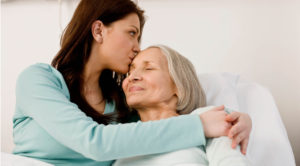A guardianship is sometimes necessary when an individual has lost sufficient functional or cognitive capacity to make or communicate significant, responsible decisions about their health and safety.
They may exhibit behaviors such as: not eating properly, avoiding prescription medications, hoarding, and poor personal hygiene. They may reject offers of guidance and assistance from family and friends. When these behaviors become out of control, someone may have to step in to take control.
A guardianship may be necessary if a catastrophic health event such as a stroke has left a person incapable of participating in their healthcare decisions and they have no surrogate decision-making documents such as a Georgia Advance Directive for Healthcare in place.
A guardianship may be appropriate if a person is living in an unsafe environment and refuses to acknowledge their circumstances and move to a safe setting.
The process of going into the county Probate court and petitioning to protect an individual at risk is called Guardianship. The relationship between the Guardian and the ward is much like that between a parent and a child. The decision-making power removed from a person should be as limited as possible and every effort should be made to observe the adult’s individual rights and dignity.
A conservatorship may be necessary when an individual can no longer make financial transactions or decisions for himself.
They may have lost functional capacity and can no longer make financial decisions, they are making poor financial choices due to a form of dementia or perhaps they are being financially exploited by another individual or family member.
The process of going into the county Probate court and petitioning to protect the resources of an individual is called Conservatorship. A Conservator has significant responsibilities including annual reporting to the court regarding the use of the Ward’s assets and as such must obtain a fidelity bond for the value of the Ward’s estate.
The attorneys of Hurley Elder Care Law, have a wealth of experience helping families in this painful and emotional time. Our Certified Elder Law Attorneys have successfully argued cases in every metro Atlanta Probate court and can assist you and your loved ones as you navigate this complex and stressful process.
If the facts indicate that an individual is in immediate and substantial risk of death or serious physical injury, illness or disease, you can file for an emergency Guardian/Conservator. The process is very similar to a permanent Guardianship/Conservatorship but the hearing must be held within 5 business days from the date of the petition. An emergency Guardianship/Conservatorship is in place until a full hearing on the Guardianship/Conservatorship takes place, or 60 days, whichever is first.
The attorneys of Hurley Elder Care Law have a wealth of experience helping families in this painful and emotional time.
Our Certified Elder Law Attorneys have successfully argued cases in every metro Atlanta Probate court and can assist you and your loved ones as you navigate this complex and stressful process.
Contact us at 404-843-0121 to discuss your situation or click the button below
Procedure for the appointment of a Guardianship/Conservatorship
Filing for Guardianship/Conservatorship
Any interested person may file a petition in county Probate Court. The petition must be signed by either two interested parties or one interested party and an affidavit of a Doctor, Psychologist or LCSW who has examined the proposed Ward in the last 15 days..
The law does not require that you have an attorney to file a petition in Probate Court. However, Guardianship is a legal proceeding that requires a hearing where evidence is presented, testimony is taken and a lawyer will be appointed to represent the Proposed Ward. If you are not represented by an attorney, you will be expected to present the evidence in the appropriate manner.
In the State of Georgia, helpful information can be found at gaprobate.gov.
Procedure for the appointment of a Guardianship/Conservatorship
A petition is filed in the Probate Court in the county where the Proposed Ward currently lives (or is currently located). There is a filing fee, which varies by county. The petition is reviewed by the Probate Court judge and is either accepted or dismissed. If the petition is accepted, the following will occur:
- The court serves notice to the Proposed Ward of what has happened and provides copies of the petition.
- The Proposed Ward is informed that he must submit to an evaluation.
- The Proposed Ward is informed that he has the right to his own attorney and that one will be provided to him within two days, if he does not hire his own
attorney. - The court will decide if it needs to appoint a guardian ad litem (an officer of
the court whose job it is to review the circumstances of the petition and make recommendations to the court for the best interest of the Proposed Ward).
After the evaluator submits their evaluation to the court, a hearing will be scheduled where the judge will decide whether or not to grant the Guardianship or Conservatorship (or both). The process takes an average of 90 days and varies by county
Responsibilities of the Guardian/Conservator
Anyone can serve as a Guardian with the exceptions of minors and persons who have a conflict of interest with the adult. There is an order of preference that the court lists when appointing a Guardian or Conservator. A person chosen by the adult has first preference. Thereafter, the preferences are: spouse, an adult child and then the parent.
The basic power of a Guardian is to make decisions regarding the Ward’s support, care, education, health and welfare. The basic power of a Conservator is to receive, collect and make decisions about the property of the Ward. Of course, the Guardian and Conservator, to the extent possible, should encourage the Ward to participate in decision making.
From the blog
Life Care Planning Model
Meet the inevitable challenges of your family's current and future needs
Appropriate Care
Asset Protection Solutions
Peace of Mind


















